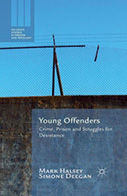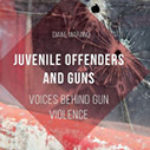Young Offenders: Crime, Prison And Struggles For Desistance

Authors: Mark Halsey and Simone Deegan
Publisher: Basingstoke, UK: New York: Palgrave Macmillan, 2015. 274p.
Reviewer: Briege Nugent | March 2017
As the authors state, this book “reduced to its simplest dimension, is about fourteen young men and their struggles to find their status” (Halsey and Deegan, 2015: 3). This description although true, denies the complexity, depth of analysis and richness of accounts that has been accomplished through over a decade of longitudinal research. This is a welcome contribution, one that pushes criminological thinking, for a number of reasons. It goes some way to filling the significant gap in qualitative in-depth research on young people attempting to stop offending, and it brings their voices, experiences and the challenges they have faced, and continue to face, to light. Through the relationships established between the researchers and participants, the young men’s vulnerabilities are revealed as being similar to their female counterparts. They have pasts of abuse, broken families, lack of love and care, pain, and ‘childhoods’ lost. The authors do not shy away from providing a ‘full’ account, detailing the offences and in some cases lack of regard for self or others. The structural and situational factors are shown to overwhelm these young men in their efforts to become good citizens.
In an attempt to make sense of their complex journeys, the metaphor of a train is adopted, with categories created to indicate varying degrees of ‘success,’ from being ‘On Track,’ to experiencing a ‘catastrophic turn.’ In all, the message is that nothing is pre-determined, and desistance is a fragile state with many obstacles, not only in securing the basics such as safe accommodation, but also accessing support. The ‘correctional system’ itself is shown time and time again to be ill thought out and actually a pull factor towards offending. For example, for one young man on parole, the conditions set were almost impossible to fulfil as he had no money and no means of getting transport to make appointments. At times, this is frankly an exasperating read because it seems that the will is there, but the means to desist are not. The real void is often meaningful help from others. The concept of care and what happens when it is not in people’s lives is central to the book, and thus is a crucial contribution raising important questions about effective intervention (and its limitations) and the place of early intervention.
What is particularly inspiring is that not only does this book set out the issues in a very clear and thoughtful way, but in turn also sets out tangible solutions. This is an essential read for criminologists and anyone working in criminal justice who wants to make a difference. The ideal would be that the readership extends as wide as possible, as it could change perceptions about people who have committed crimes. Their success in going ‘straight’ has as much to do with what we as a ‘society’ think of them and how far we allow them to move on from their past, as does what they do in the present and future.
Briege Nugent, Independent Criminologist


